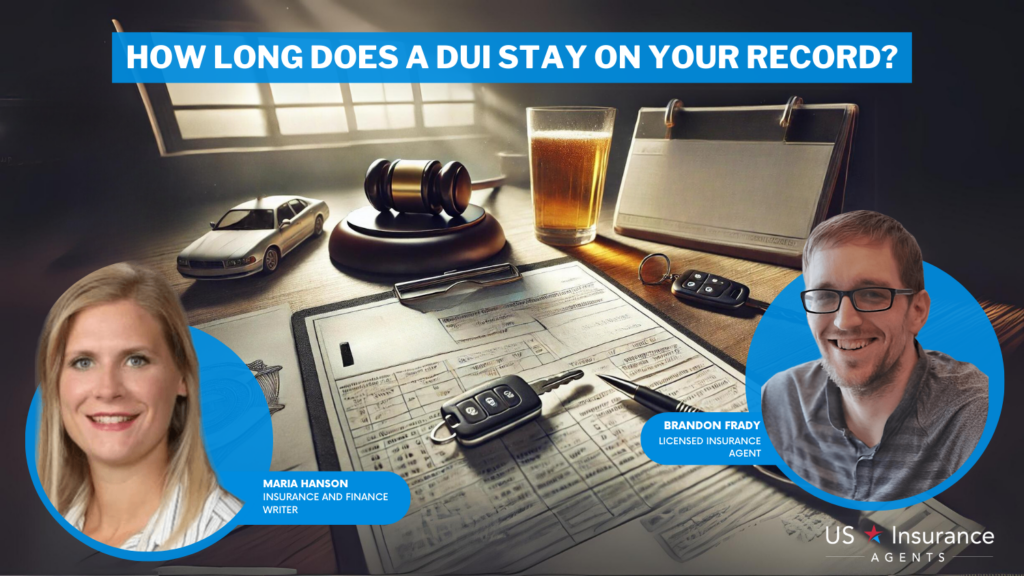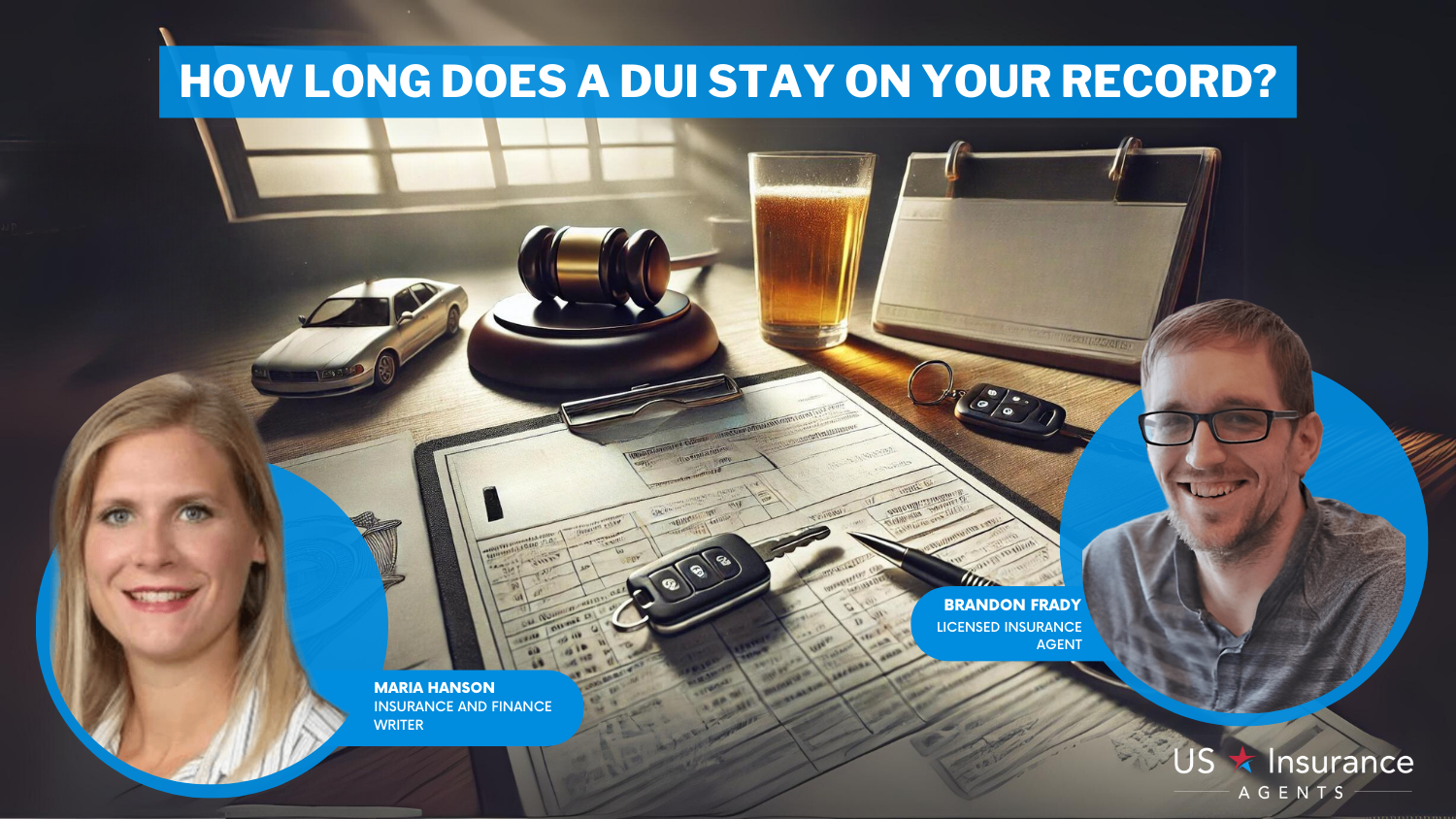How long does a DUI stay on your record?
How long does a DUI stay on your record? Gain insights into the lasting effects of a DUI conviction. Explore insurance rate increases, license suspension periods, and legal ramifications. Understand the importance of responsible driving and access reliable information from a trusted resource to make informed decisions.
Read more Secured with SHA-256 Encryption





Table of Contents
Table of Contents


Insurance and Finance Writer
Maria Hanson grew up with a unique passion and understanding of both the automotive and insurance industries. With one grandfather in auto mechanics and another working in insurance, you could say automotive insurance is in her blood. Her love of research and finance serves her well in studying insurance trends and liability. Maria has expanded her scope of expertise to home, health, and life...
Maria Hanson


Sr. Director of Content
Sara Routhier, Senior Director of Content, has professional experience as an educator, SEO specialist, and content marketer. She has over 10 years of experience in the insurance industry. As a researcher, data nerd, writer, and editor, she strives to curate educational, enlightening articles that provide you with the must-know facts and best-kept secrets within the overwhelming world of insurance....
Sara Routhier


Licensed Insurance Agent
Brandon Frady has been a licensed insurance agent and insurance office manager since 2018. He has experience in ventures from retail to finance, working positions from cashier to management, but it wasn’t until Brandon started working in the insurance industry that he truly felt at home in his career. In his day-to-day interactions, he aims to live out his business philosophy in how he treats hi...
Brandon Frady
Updated January 2025
Are you wondering, “How long does a DUI stay on your record?” Curious about recycling at home and looking for ways to make a positive impact on the environment?

We delve into these two important topics. We’ll explore the duration of a DUI record, including factors that can affect its length and potential consequences.
Additionally, we’ll provide insightful tips on effective recycling practices at home, highlighting the significance of reducing waste and conserving resources. To ensure you have the best insurance coverage, enter your zip code below and compare rates from top providers. Take the first step towards safeguarding your future and the planet today!
How long does a DUI stay on your record in each state?
So how long does a DUI stay on your insurance? DUIs remain on your record for a minimum of five years, but most states only remove DUI charges after 10 years. Certain states go even further. New Mexico, for example, keeps a DUI on your record for 55 years and Florida for 75.
Have you ever wondered what stays on your driving record for life? Depending on where you were charged, a DUI might. DUI charges are permanent in the following 11 states:
- Alaska
- Idaho
- Illinois
- Indiana
- Kansas
- Maine
- Ohio
- Oregon
- Tennessee
- Texas
- Vermont
Unless you get a DUI charge expunged, your insurance rates will always be higher than the average in those states.
Free Auto Insurance Comparison
Compare Quotes From Top Companies and Save
Secured with SHA-256 Encryption
How long does a DUI affect insurance rates?
So what about insurance- how long does a DUI stay on record for insurance?
From speeding tickets to accidents, any stain on your record can increase the cost of insurance. Getting charged with a DUI can increase your auto insurance rates more than if you get a minor traffic violation or are in an at-fault accident.
Car Insurance Monthly Rates Based on Driving Record by Provider
Insurance Company Monthly Rates Rates After a DUI Percent Increase
$228 $385 68%
$198 $275 64%
$114 $309 68%
$248 $447 79%
$164 $338 67%
$195 $200 96%
$123 $160 73%
$141 $294 98%
DUIs can increase your car insurance rates by 37% on average. Some companies, such as Progressive and State Farm, have lower penalties for DUI charges. However, most companies take DUIs more seriously. Geico could even increase your rates by 127%.
How long a DUI affects your insurance rates depends on the company that insures you and the state you were charged in. Some companies may stop charging you a DUI rate after three years, but for most companies, your rates will be higher for as long as you have a DUI on your record.
Insurance companies check how many points you have on your driver’s license to determine your rates. The more points you have, the higher your rates will be.
When do DUI points go away?
Over time, states may remove those points after a set period. Most states keep the points on your record between one and three years, but in California, you’ll have those points for 13 years.
Fortunately, some states will remove points incrementally if you continue to maintain a clean record moving forward. In many states, you can even remove violations from your driving record by taking a defensive driving course.
How can you save money on car insurance if you have a DUI?
Even though your base rate will increase, you can still find ways to save money.
Check if you can remove violations from your driving record. You may be able to contest tickets or take certified defensive driver courses to lower your insurance rates. If you need something expunged, you may be able to simply pay a fee and file a form if you meet your state’s requirements. Cleaning up your record could significantly reduce your rates.
Contact your local DMV for a copy of your driving record. You can also get a copy from:
- The Bureau of Motor Vehicles
- The Office of the Secretary of State
- The State Department of Revenue
- The Department of Public Safety
- Your state’s Motor Vehicle Division
If you need more severe DUI charges expunged from your record, you’ll likely need the assistance of an attorney who’s familiar with your state’s DUI laws.
Luckily, having a DUI on your record doesn’t disqualify you from taking advantage of discounts. There are various types that may be useful to you, including those based on:
- Biographical information- Age, gender, marital status, education level, profession, and credit score can all affect your rates.
- Vehicle and vehicle equipment- Inexpensive cars with good safety ratings and anti-theft systems cost less to insure.
- Payment type- Go paperless, set up autopay, or pay in full to save money.
- Policies- Lump your various policies, such as life insurance or homeowners insurance, under one company to get a discount.
- Driving history- Reducing the number of claims and violations over time will get you discounted rates.
Maintaining a clean driving record will have the most significant effect on your car insurance. Get familiar with your local traffic laws, avoid violations, and don’t be at fault for accidents, especially while under the influence.
What are the penalties for getting a DUI?
The law cracks down hard on DUIs because driving under the influence is incredibly dangerous. According to the National Highway Traffic Safety Administration, statistics show that 32 people per day die due to drunk driving, which accounts for 30% of all fatal auto accidents across the United States. These accidents are highly preventable, so the law imposes hefty fines and strict sentences to deter drivers from operating a vehicle while impaired.
Specific penalties for DUI convictions are different from state to state. The repercussions also depend on whether your DUI was charged as a misdemeanor or a felony. You could face felony charges if you’ve had prior DUI convictions or caused a fatal accident while under the influence.
A misdemeanor could result in a fine, license suspension, or even jail time. A felony, such as vehicular homicide, could result in a $50,000 fine and potentially a life-long prison term. Lesser felonies such as vehicular assault, where a third party sustains a substantial injury, could result in a $20,000 fine and a prison sentence of up to 10 years.
In most states, you may have driver’s license points added to your record. Points are added to your driving record for any traffic violation, and accumulating too many points can result in the suspension or revocation of your license.
All states track and weigh points differently. Texas, for example, only adds two points after a DUI conviction, while Arkansas adds 14. Some states, such as Oregon and Rhode Island, don’t even have point systems.
In some states, you may be required to file an SR-22 after getting a DUI charge. This is a court- or state-ordered document that proves that you have the standard car insurance required by the state. In Florida and Virginia, you’ll need an FR-44 instead. The FR-44 document functions like an SR-22, but the minimum insurance requirements are doubled if you need an FR-44.
Free Auto Insurance Comparison
Compare Quotes From Top Companies and Save
Secured with SHA-256 Encryption
DUIs and Their Lasting Effects on Your Record
Insurance companies favor customers who drive safely and lawfully, so having a clean driving record is one of the best ways to keep your auto insurance rates low. All it takes is one DUI to increase your car insurance rates for years to come.
Hopefully, after reading this guide, you understand the long-lasting effects of having a DUI on your record and can confidently explore the different ways you can save money on car insurance.
Case Studies: How long does a DUI stay on your record?
Case Study 1: John’s DUI Record
John was arrested for a DUI in 2015 and subsequently convicted. He completed all the required penalties, including attending mandatory DUI education programs and fulfilling probation terms. In John’s jurisdiction, a DUI conviction stays on an individual’s record for 10 years. After the completion of his 10-year probation period, John’s DUI was expunged from his record, and it no longer appears in his background checks.
Case Study 2: Sarah’s DUI Record
Sarah faced a DUI charge in 2018, and she pleaded guilty to the offense. In Sarah’s state, a DUI conviction remains on the record for 5 years. Following the completion of her probation and adherence to all required penalties, Sarah’s DUI was expunged from her record in 2023, marking the completion of the 5-year duration.
Case Study 3: Michael’s DUI Record
Michael received a DUI conviction in 2019, and his state has a different set of regulations regarding the retention period of DUI offenses. In his jurisdiction, a DUI stays on an individual’s record for life. Despite fulfilling all the required penalties and maintaining a clean record since the incident, Michael’s DUI conviction will remain permanently on his record.
Case Study 4: Emily’s DUI Record
Emily was convicted of a DUI in 2017. In her state, a DUI offense remains on an individual’s record for 7 years. After serving her probation and completing all mandated penalties, Emily’s DUI will be expunged from her record in 2024, exactly 7 years after the conviction.

Frequently Asked Questions
How long does a DUI stay on your record?
A DUI conviction can stay on your record for at least five years, but some states leave it on permanently, while others remove it after 10-55 years.
How long does a DUI affect insurance rates?
A DUI can increase your auto insurance rates by approximately 37%, and your rates will be higher for as long as you have a DUI on your record. However, some insurance companies have lower penalties for DUI charges than others.
When do DUI points go away?
The duration for DUI points to be removed varies by state, with most states keeping them on your record for between one and three years. California is an exception, keeping them for 13 years.
How can you save money on car insurance if you have a DUI?
You can contest tickets or take certified defensive driver courses to lower your insurance rates. Cleaning up your driving record by removing violations could significantly reduce your rates.
What are the penalties for getting a DUI?
The severity of penalties for getting a DUI varies by state, but you can face fines, license suspension or revocation, jail time, and increased insurance rates.
Which states have permanent DUI charges on driving records?
Eleven states, including Alaska, Idaho, Illinois, Indiana, Kansas, Maine, Ohio, Oregon, Tennessee, Texas, and Vermont, have permanent DUI charges on driving records.
Get a FREE Quote in Minutes
Insurance rates change constantly — we help you stay ahead by making it easy to compare top options and save.





